
Princeton doctoral student kidnapped in Iraq by Iran-backed militia
A Princeton doctoral student has been kidnapped in Iraq while doing field work in the country, according to Israel’s Prime Minister Benjamin Netanyahu on Wednesday. “Elizabeth Tsurkov is still alive and we hold Iraq responsible for her safety and well-being,” Mr Netanyahu wrote in a statement. Ms Tsurkov is an Israeli-Russian dual citizen, the Israeli prime minister wrote. She is also a fellow at the Washington DC-based think tank, New Lines Institute, and is a contributor to New Lines magazine. They wrote they hadn’t heard from her since 19 March, when she said she wanted to leave the Middle East and return to Princeton to write her dissertation. They added that just over a week after hearing from her, they “learned from our sources that a pro-Iranian militia had kidnapped her in Baghdad.” The writers underscored that Ms Tsurkov’s work “poses no threat to anyone.” The magazine also wrote that Ms Tsurkov “is an outspoken critic of all three of the major likely players involved in negotiating her release: Israel, Iran and Russia.” The group said that they reached out to US and foreign officials and will continue to do so. They urged the United States to get involved in her release, because despite the fact she is not a US citizen, she “is very much a part of America,” they wrote. “She works with a Washington think tank, writes for an American magazine and studies at Princeton University. She deserves America’s every effort to bring her to safety,” New Lines magazine writers said. Ms Tsurkov’s family also confirmed details of her disappearance in a statement. “She was kidnapped in the middle of Baghdad, and we see the Iraqi government as directly responsible for her safety,” the family’s statement said. “We ask for her immediate release from this unlawful detention.” Read More Missing two-year-old’s grandmother shares ‘mental torture’ after alleged kidnapper arrested Kremlin open to talks over potential prisoner swap involving detained WSJ reporter Evan Gershkovich Death of student, 20, outside club ‘senseless and avoidable’, court told
2023-07-07 03:56
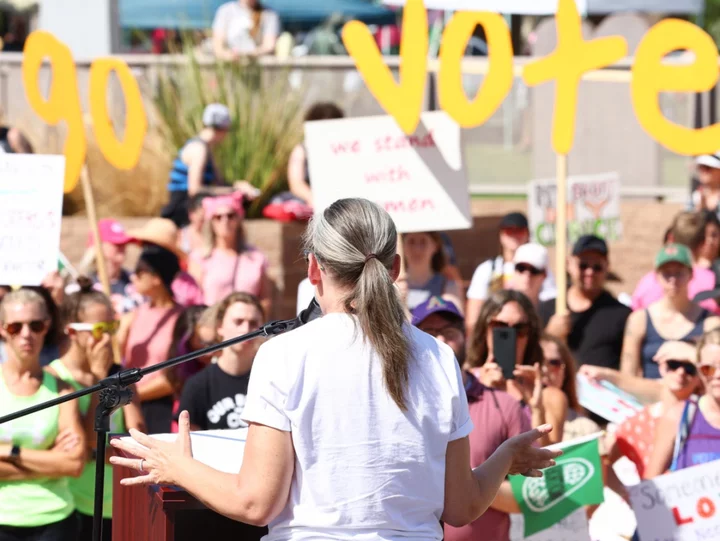
Turnout spiked among younger voters in the last three elections. This is what’s needed for that to be repeated in 2024
Long thought to have given up on politics and given in to apathy, the political activity of younger people is now surging. In 2018, the first election since former President Donald Trump’s 2016 win, turnout spiked among younger voters, with almost double the number of those in their late 20s and early 30s taking part compared to the previous midterms in 2014. Younger voters strongly supported the Democratic Party, helping them take back the House in 2018 and the Senate after the Georgia runoffs in early 2021, but it was unclear if the spike in participation would carry on after Mr Trump left the White House in January 2021. Taking into account the 2022 midterms where Democrats held onto the Senate and lost the House by a smaller margin than expected, the progressive research firm Catalist states in a report that “Gen Z and Millennial voters had exceptional levels of turnout, with young voters in heavily contested states exceeding their 2018 turnout by 6% among those who were eligible in both elections”. Similarly, the Center for Information & Research on Civic Learning and Engagement (CIRCLE) at Tufts University released an analysis shortly after the 2022 midterms stating that “young voters in Arizona, Nevada, Georgia, Wisconsin, and Pennsylvania gave Democratic candidates a winning advantage in close races”. In Arizona, Democrat Katie Hobbs beat Republican Kari Lake by 17,117 votes in the governor’s race. “Young people provided a net of 60,000 votes toward” Ms Hobbs, handing her the win, according to CIRCLE. In the Nevada senate race, young voters backed Democrat Catherine Cortez-Masto at a rate of three times her margin of victory. In the Georgia senate race, younger voters gave Democratic Senator Raphael Warnock 116,000 net votes against Republican nominee Herschel Walker in 2022. Rev Warnock received just 35,000 more votes in a race that moved ahead to a runoff where the Democrat retained his seat. In Pennsylvania, Democratic Senator John Fetterman beat Mehmet Oz by about 190,000 votes with young voters providing him with a net 120,000. Wisconsin Governor Tony Evers won re-election by 89,000 votes as young voters cast a net 79,000 ballots in his column. “In close elections decided by just a few percentage points, young voters can be more than influential: because of their often vastly different vote choice compared to older voters, they can be decisive,” CIRLE writes. The lead author of that study, CIRCLE elections coordinator Ruby Belle Booth, tells The Independent that “we’ve been seeing over these last three cycles a new generation that’s really finding its political voice. “And if you think about when their civic development has been happening, they’ve had access to smartphones and the internet and social media that’s given them both unprecedented access to information and also connecting them with one another.” But she goes on to note that these voters have become adults in an age of extreme partisanship and political strife – often involving issues that are important to them such as the climate crisis and gun violence. “Our research shows that they really see the power in their own voice,” Ms Booth says. Catalist found that “65% of voters between the ages of 18 and 29 supported Democrats, cementing their role as a key part of a winning coalition for the party”. “While young voters were historically evenly split between the parties, they are increasingly voting for Democrats. Many young voters who showed up in 2018 and 2020 to elect Democrats continued to do the same in 2022,” the research company added. According to the US election project operated by political scientist Michael McDonald at the University of Florida, 111 million votes were cast in 2022 compared to 118 million in the previous midterms in 2018. “In the last few elections, in particular, I think there have been these issues that have really been motivating young people and getting them to the ballot box more so than … particular candidates or the influence of political parties,” Ms Booth says. This “issue engagement” and organising spearheaded by young people has helped increase turnout among younger voters, she adds. Speaking about the 2018 midterms, Ms Booth mentions the Parkland school shooting, saying that gun control was a “major motivating force”. “Young people who said that they supported or were actively involved in the post-Parkland movement were 21 percentage points more likely to say they voted, which I think just goes to show that connection between issues and organizing and turnout,” she says. “In 2022, I think that issues, again, like gun control and abortion and climate and student loan debt brought people out to the polls.” “It’s not just that young people care about gun violence and gun control – it’s that there have been these youth-led movements to get young people to connect those issues to elections and to voting,” she adds. CIRCLE found after the 2022 midterms that “Young voters are more likely to trust elections and feel democracy is secure, as well as to identify as independents”. Optimism about the future is also higher among younger voters compared to their older counterparts. “In 2022, one of the big pushes, especially with ... older Democratic voters ... was that this is a chance to save democracy because there are all these candidates who are … threatening democracy. And I think that that isn’t necessarily something that young people really connect to because they haven’t necessarily seen democracy functioning super well historically because of this partisanship and not seeing action on the issues that matter to them,” Ms Booth says. She adds that younger voters are less likely to be swept up in the culture war and in partisan arguments because they “just want things to get done that will provide them with a healthier, healthier, happier, better life”. When asked if younger voters are motivated to go to the polls more by fear and anger rather than optimism, Ms Booth notes that following the 2018 election, CIRCLE found that young people who were more cynical about politics were more likely to vote. “But I don’t think that necessarily means that everyone is going to the polls from a place of total cynicism,” she says, adding that seeing political accomplishments that further their interests means they’re “going to be coming to the polls with a bit more optimism and hope”. “There’s going to be times when they’re enraged and want to make sure that their rights are being protected. I think it is really circumstantial, and I’m not sure that we have the data to answer which is more motivating because I think it will depend on every young person and the state that they’re in and the political dynamics that that they’re going through,” she adds. A CIRCLE survey released earlier this year found that 55 per cent of people between 18 and 29 believed that the country is moving in the wrong direction while only 16 per cent believe it’s on the right track. Twenty-eight per cent were unsure. Asked if millennials are bucking the trend of voters growing more conservative with age, Ms Booth says: “The one thing I always come back to when talking about that sort of trend … is that the lives that millennials are leading now are really different from the ones … that boomers were when they were the same age”. She adds that a number of the “milestones” that are seen as being a part of becoming more conservative, such as getting married or buying a house, “millennials relate to differently because they have a different relationship to the institution of marriage”. “They also have a really different economic situation and it’s going to be a lot longer before most millennials are able to buy a house,” she says. “I’m not sure if that is actually impacting how they’re experiencing their political beliefs but I think it’s hard to ignore the fact that there are these very real differences. “I’m not surprised that we would see that bear out in their political leanings as well.” She sees that trend continue with Gen Z. “Millennials were more diverse, more progressive, and in some ways more engaged than Gen X when they were young. And I think we’re seeing that now” with Gen Z. Members of Gen Z were first able to vote in the 2018 election, “and we did see that huge bump. Whether that was all Gen Z is impossible to say,” she says, adding that younger voters are making the electorate trend more liberal and more engaged. “But it’s hard to say if that’s an overt difference between Millennials and Gen Z or if … they’re just new young people in the fray,” she notes. While the political activity of younger voters is on the rise, older voters still have them beat in terms of turnout. According to the Brookings Institution, in the 2022 midterms, “18- to 29-year-olds showed a noticeable decline in turnout since 2018, with the oldest group (over age 65) registering a modest gain”. In the 2018 and 2022 midterms, more than 30 per cent of 18-29 year-olds voted, compared to around 20 per cent in the 2014 midterms. Among those 65 and above, more than 60 per cent voted in both 2018 and 2022. Brookings noted that “as in the past, older eligible voters displayed higher turnout rates overall than younger eligible voters”. Ms Booth says that “There’s a lot of barriers to voting that young people face that older people don’t … things like policies that get rid of early voting and policies that limit mail-in voting and policies that make it harder to register to vote”. Younger voters are “more likely to move around a lot … which can make it harder to update your registration and to follow the different local rules about voting and elections”. “I think a lot of older adults are like, ‘Oh, voting is easy’ – Yeah, it’s easy if you’ve done it a million times,” she adds. “But if you’ve never registered to vote before, you don’t know what a county clerk is, it can be not only challenging to find that information but also really intimidating.” A CIRCLE analysis from earlier this year states that just “half of youth say they’re ‘as well-informed as most people’ and only 40 per cent say they feel well-qualified to participate in politics”. “I think that young people don’t want to make uninformed votes and they definitely desire more information,” Ms Booth says. “I think there’s a tendency to be like, ‘Oh, well, young people don’t vote because they don’t care’ – But I think it’s a lot more likely that it’s because they are facing these barriers, whether it’s because they just literally don’t know how to register because nobody’s ever told them or they don’t think their vote or their voice matters because no one’s ever told them it does,” she adds. Ms Booth said there’s an “opportunity between now and 2024, to make sure that every single young person has the information and resources they need to get registered to vote and to cast their ballot. “It’s also about building this confidence and building this self-assuredness and sense of self-efficacy – there are over eight million young people who are going to turn 18 between 2022 and 2024. And I think that they really represent this opportunity to get young people engaged. “They’ve never done this before. It’s going to be their first presidential election … So we can either have a huge investment in making sure that those young people get the information they need, or we can fail to invest and they won’t be given the tools and information they need to turn out.” “If that happens with 18,19 year-olds, and with 18-29 year-olds who are still building that habit of voting, I think you’re going to be a lot more likely to see that young people don’t turn out as much in 2024,” she cautions. “If we’re showing up for young people between now and 2024, then young people will likely show up at the ballot box and once again prove to be this really influential force but they’re not just going to do it without the support and the organizing that’s been happening for the last six years.” “Young people have this tendency to really be focused on issues ... and less on the broader political landscape … but if Trump is on the ballot in 2024, I think that will be a different story,” she notes. Ms Booth says that the issues young voters tend to care about are “closely intertwined with their lives and their identities” mentioning the movement for racial justice in 2020 and the struggle for reproductive rights in the wake of the Supreme Court striking down Roe v Wade. “I think for young women, it’s easy to feel like your very self-hood is under attack when that’s being threatened and for other young people who may see the restrictions on abortion as a win because there’s also plenty of anti-abortion young people – they’re seeing their religious beliefs or moral beliefs really tied up in these political issues,” she adds. The elections coordinator says the internet and social media shouldn’t be relied upon as the “main place that young people get their information because some people’s TikTok feeds are going to be all politics and other people’s are going to have no politics, and that’s just how these algorithms work”. This is why it’s important for other groups and institutions to step up to “serve as a political home” for younger voters, she adds. “Some young people live in families and communities where everyone’s talking about politics and others live in communities where no one’s talking about politics. So there are a lot of different factors that can be feeding into if people are actually informed or not. I think it’s not a given that just because the information exists on the internet they’re going to necessarily know to even look for it. “The young people who didn’t vote in 2022 – 38 per cent said they forgot or were too busy, which can be solved with more information – more people telling them when the election is, or with policies that provide opportunities for things like early voting and absentee voting,” she notes. “Thirty-two per cent said they didn’t think it mattered or it wasn’t important to them … I think we can we can fix that with information as well.” “When you’re looking at a midterm election … there are also all these local elections that can be really confusing and hard to understand like what even is a lieutenant governor – I think a lot of young people haven’t learned about that in their schooling,” Ms Booth adds. She notes that the “information ecosystem” gets more challenging as you move towards more and more local issues. “I think about my local news, so much of it is behind a paywall that if I’m a young person, I’m not going to know who’s running for city council,” she says. “Some young people, they’re going to hear about voting and registering to vote in school and they’re going to jump at the opportunity, other young people … they’re going to be less likely to vote because they hate school. “So it’s really important that they have multiple places where they’re hearing about voting and elections, to help to start to build that self-efficacy and that feeling like they actually are qualified,” she adds. Asked if 2024 ends up being a Trump v Biden rematch will lead to a spike in young voter turnout, Ms Booth says, “I think about this every day – I have no idea”. “I think the difference is going to be made if these political leaders are speaking to young people and talking about the issues that matter to them and bringing them on as staffers on their campaigns and having outreach not only to the young people who are easy to access, like the young people on college campuses – but going beyond that and making sure that every young person, whether they’re in college or not, no matter their background, no matter where in the country they are, that they’re being spoken to and being heard,” she says. “I think it’s so hard to play this prediction game because when it comes to young people, it really depends on what a lot of other people are doing. “Traditionally, we see that the Democratic Party and Democratic campaigns do a better job of reaching a diversity of young people … but that doesn’t mean that that can’t change. And it doesn’t actually reflect what’s happened so far this election cycle.” Read More Florida will make Republican candidates sign loyalty pledge to support eventual nominee Trump adviser brands VP-hopeful Kari Lake a ‘shameless, ruthless demagogue’ DeSantis doubles down on ‘homophobic’ anti-Trump ad: ‘Totally fair game’ Wisconsin governor seals 400 years of public school funding increases with budget veto Democratic council member joins race for Indiana's open US Senate seat Florida will make Republican candidates sign loyalty pledge to support eventual nominee
2023-07-07 03:46

California man admits to hiding mother’s death and collecting $830k in benefits
A California man pleaded guilty last week to hiding his mother’s death from the federal authorities for over 30 years, collecting more than $800,000 in benefits under her name. Donald Felix Zampach, 65, pleaded guilty to one count of money laundering and one count of Social Security fraud, according to the Justice Department. “This crime is believed to be the longest-running and largest fraud of its kind in this district,” US Attorney Randy Grossman said in a statement. “This defendant didn’t just passively collect checks mailed to his deceased mother. This was an elaborate fraud spanning more than three decades that required aggressive action and deceit to maintain the ruse.” All told, beginning in 1990, the Poway man collected $830,238. He could face up to 25 years in prison, though US sentencing guidelines suggest it will more likely be a sentence of 30 to 37 months. “He is overwhelmed with regret,” Knut Johnson, Zampach’s lawyer, told The New York Times. As part of his plea deal, Zampach will forfeit the benefit, pay restitution to various lenders, and turn over the home he took possession of in his mother’s name. The benefits scheme was an elaborate one, according to the DoJ. When Zampach’s mother was diagnosed with pancreatic cancer, she left the US and returned to her native Japan, where she died in 1990 at age 61. Her son notified the US embassy in Tokyo of the death, but admitted to leaving blank a box for her Social Security number to avoid the government being aware of her passing, and he repeated this omission on forms for burial permits. Zampach kept up this ruse until September 2022, collecting his mother’s Social Security checks and payments from the Defense Finance Accounting Service, which pays survivors of military veterans. An audit of those over age 90 who hadn’t used their Medicare benefits helped reveal the California man’s scheme. This sort of fraud has happened in the past. In 2018, a Mexican man pleaded guilty to defrauding the government for even longer, spending 37 years collecting nearly $361,000 in government benefits after assuming the identity of a US citizen, according to The San Diego Union Tribune. In 2015, Dutch police learned that a man kept his dead mother’s body hidden for over two years and continued collecting her pension and social assistance payments. He was later caught and forced to repay 40,000 euros, according to 1 Limburg. Read More Real Housewives star Phaedra Parks reveals why she gave her son $150,000 for his 13th birthday Mastercard helping banks predict scams before money leaves customers’ accounts Vermont will pay $16.5M to settle lawsuits by foreign investors in fraudulent ski developments
2023-07-07 03:29
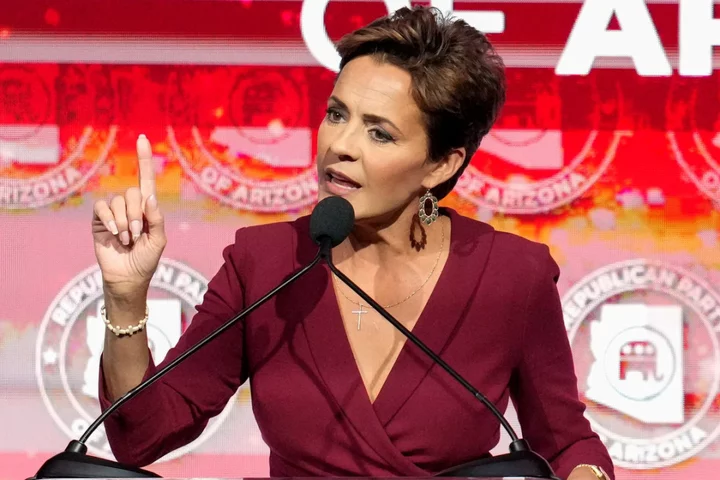
Trump adviser brands VP-hopeful Kari Lake a ‘shameless, ruthless demagogue’
Just days after failed Arizona gubernatorial candidate Kari Lake said she was considering a Senate run, Donald Trump’s advisers revealed that the former president has become disenchanted with her in recent months. Ms Lake announced on Saturday that she was weighing a Senate run, despite repeatedly losing legal challenges to her election loss. “Politics is gross. It’s a slimy business, but I think we need real people to be in it. And so I am contemplating running for office again,” she told Breitbart. According to The Daily Beast, the former president specifically found Ms Lake’s attempts to get attention distasteful. “She’s a shameless, ruthless demagogue who wants power and will do whatever she has to do to get it,” a Trump adviser told the publication. Ms Lake has tried to position herself as a potential contender to become Mr Trump’s pick for vice president—a tactic the former president also apparently did not appreciate. The former president doesn’t like how Ms Lake is “running around saying she should be VP,” an adviser told the outlet. “Tells you all you need to know that he did not make her his national spokeswoman,” they added. “She was an obvious choice.” Another adviser told The Daily Beast that the former president “sees through her gambit for the vice presidency.” An operative close to the Trump campaign also chimed in, telling the outlet: “I think she is an effective surrogate, but I’m not sure she will be a VP pick,” also suggesting that the Arizona Republican could serve as the former president’s press secretary if elected again. Despite the criticisms coming from Mr Trump’s orbit, a spokesperson for Ms Lake told the publication that the rumors were “pathetic attempts from Team DeSantis.” “MAGA world is more United [sic] than ever and ready to win big in 2024,” the spokesperson said. In June, reports emerged that the Arizona Republican was “couch-surfing” at Mr Trump’s Mar-a-Lago home. “Kari Lake is there all the time,” a source told PEOPLE Magazine. “There’s a suite there that she practically lives in.” Ms Lake’s adviser responded to the news, telling The Independent: “This is a ridiculous story from a gossip tabloid that frankly we thought went out of business in the early 2000’s. Kari Lake often speaks at events all over the country in support of America First candidates and organizations; and when she does have the honor of being invited to speak at the beautiful Mar-a-Lago, she overnights at Hilton properties in Palm Beach with her loving husband of 25 years.” Read More Arizona election denier Kari Lake ‘couch-surfing like a bum’ at Mar-a-Lago, ex-Trump lawyer says Arizona Republican election official sues Kari Lake for defamation ‘This will escalate’: Kari Lake called out over incendiary threat to Biden admin after Trump indictment
2023-07-06 23:52
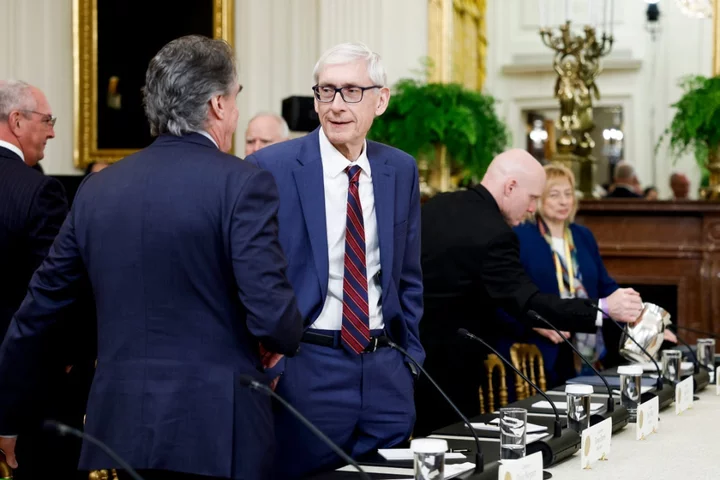
Wisconsin governor seals 400 years of public school funding increases with budget veto
Wisconsin Gov Tony Evers, a Democrat, used his line-item veto power to enact a state budget that increases spending for public schools for the next 400 years, The Milwaukee Journal Sentinel reported. Mr Evers used the broad powers given to Wisconsin governors to strike a hyphen and the “20” from a reference to the 2024-2025 school year. The line-item veto will make sure that the limits that the state imposes on school districts on how much they are allowed to raise per student will increase by $325 until 2425. The line-item veto will table debates between the two parties during the budget-writing season. Republicans control the state legislature in Wisconsin. Mr Evers said that the move would “provide school districts with predictable long-term increases for the foreseeable future.” Mr Evers also used his line-item veto to nullify much of Republicans’ proposed $3.5m tax cut that would have mostly slashed taxes on the state’s wealthiest residents. But Robin Vos, the speaker of the state House, decried the move. “Legislative Republicans worked tirelessly over the last few months to block Governor Evers’ liberal tax and spending agenda. Unfortunately, because of his powerful veto authority, he reinstated some of it today,” he said in a statement. Dan Rossmiller, who represents the Wisconsin Association of School Boards, said that while the permanent annual funding was “certainly appreciated,” the additional funding could vary depending on the school district and that the rate might not meet or exceed inflation rates in some districts. “I wish the amount would have been higher,” he said. “With inflation at 40-year highs, it's really important to be able to attract and retain teachers and staff, and to be able to pay the increased costs of everything in a school district's budget.” Republicans likely could not override Mr Evers’s action since they lack a veto-proof majority in the state legislature. Read More Watch live: Trump aide Walt Nauta attends court on charges related to classified documents DeSantis doubles down on ‘homophobic’ anti-Trump ad: ‘Totally fair game’
2023-07-06 23:22
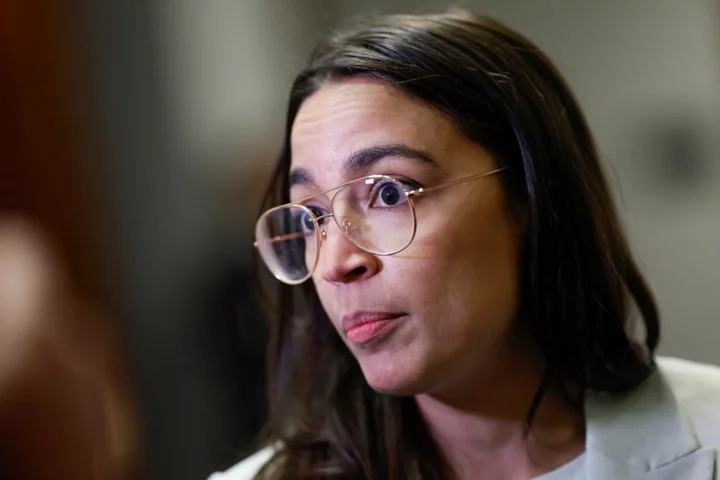
AOC shares fear her Threads app was ‘bricked’ five minutes after joining Twitter rival
Rep Alexandria Ocasio Cortez tweeted that her account on Threads – Mark Zuckerberg’s Twitter rival app – was “bricked” after being on the app for just “5 minutes,” on the day of the app’s launch. Highlighting her move to Threads – on Twitter, no less – is perhaps the New York Democrat’s latest move in her feud with Twitter owner Elon Musk. Earlier on Wednesday, she wrote a thread, seemingly taking a jab at Twitter: “Alright, let’s do this thing! May this platform have good vibes, strong community, excellent humor, and less harassment.” It’s unsurprising that the New York congresswoman jumped on the opportunity to join the “Twitter killer” platform, as she hasn’t been shy about her gripes with Mr Musk and his platform. In May, Ms Ocasio-Cortez flagged an imposter account, which she said Mr Musk reacted to with a flame emoji, drawing more attention to the fake account. She tweeted at the time: “FYI there’s a fake account on here impersonating me and going viral. The Twitter CEO has engaged it, boosting visibility.” On other occasions, she has pointed out the dangers of circulating misinformation on Twitter and the problems with potential misinformation after Mr Musk removed checkmarks from official accounts. The New York Democrat also voiced opposition to Mr Musk’s move to make users pay for a blue check mark, tweeting: “Lmao at a billionaire earnestly trying to sell people on the idea that ‘free speech’ is actually an $8/mo subscription plan.” Read More AOC warns Elon Musk is ‘testing waters’ to interfere in 2024 election AOC threatens to leave Twitter after Elon Musk promotes ‘disgusting’ account impersonating her AOC jokes more people watched her gaming online than listened to glitch-ridden DeSantis launch
2023-07-06 22:25
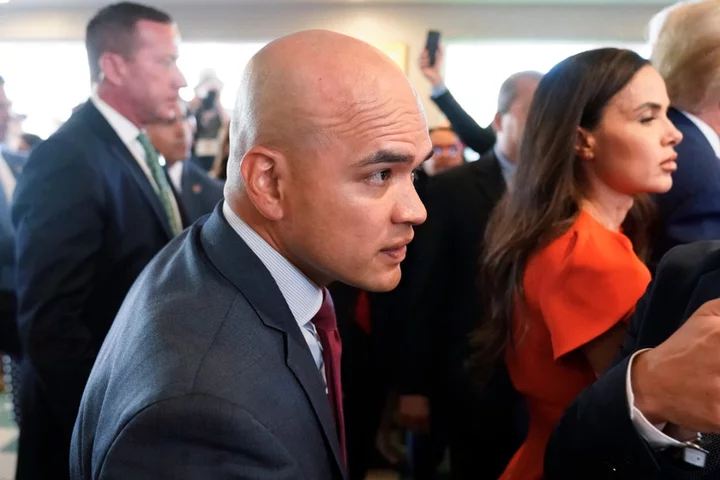
Trump’s co-defendant in classified documents case still hasn’t hired a lawyer
Nearly a month after former president Donald Trump was arraigned on the 38-count federal indictment he and his longtime aide Walt Nauta are facing for allegedly unlawfully retaining national defence information and obstructing justice, the ex-president’s co-defendant still needs legal representation. Mr Nauta, a retired Navy chief petty officer who served as Mr Trump’s White House valet before following him home to Florida after the end of the ex-president’s term, is charged with a single count of making a false statement to federal investigators. The other 37 charges are against Mr Trump, who pleaded not guilty to all of them at his arraignment last month. But even though the charge against him was unsealed at the same time as the charges against his boss, Mr Nauta was not arraigned at the same time as Mr Trump because he did not have a local attorney to appear with him in court. A second attempt to arraign him was scuttled last week after his flight to Florida was cancelled, and a third attempt to arraign him is set for Thursday. Although he is represented by a veteran Washington-based criminal defence lawyer, Stanley Woodward, the Trump aide still needs a lawyer who is licensed to practice in the Southern District of Florida to sponsor Mr Woodward so he can be admitted to practice before that federal court. And without local counsel, Mr Nauta won’t be able to enter a plea when he appears in court. Last week, Mr Woodward told the federal magistrate judge who is set to preside over the arraignment that Mr Nauta would attempt to find a Florida-based attorney by his third attempt at an arraignment, but a review of court records does not show that any local lawyer has officially entered an appearance for him. Although the magistrate judge, Edwin Torres, excused Mr Nauta from appearing in person at the 27 June court date because weather had caused him to be unable to travel, he told Mr Woodward at the time that he could “discuss” the need for a court-appointed lawyer for Mr Nauta if necessary. The charge against Mr Nauta stems from a May 2022 interview with FBI agents, during which he was asked about boxes Mr Trump had brought with him to his Palm Beach, Florida social club after leaving the White House. When investigators asked if he knew of any boxes being brought from a storage room to Mr Trump’s private suite at the club, Mr Nauta replied that he did not even though he had participated in moving some of the boxes at issue. Read More Trump news – live: Trump suggests White House concealing security footage over cocaine scandal as Don Jr branded ‘big baby’ DeSantis doubles down on ‘homophobic’ anti-Trump ad: ‘Totally fair game’ Australian minister calls Donald Trump Jr a ‘big baby’ for cancelling trip down under
2023-07-06 22:23

Trump news – live: Trump calls special prosecutor a ‘crackhead’ in response to White House cocaine discovery
Most presidents, current and former, typically spend America’s Independence Day celebrating the values of US society that bring its citizens together, joining in the festive and unifying themes of the national holiday. And then there’s Donald Trump. The former president spent July 4 fuming at his enemies on Truth Social, resharing a vulgar message aimed at President Joe Biden and the tens of millions of Americans who voted for him in 2020. ““F**k Biden and f**k you for voting for him”, read the post. Later, he continued his holiday rant by branding the president a “very dangerous idiot in the White House”. He also posted a bizarre image of himself imposed into the Revolutionary War, prompting social media users to suggest he is more like Benedict Arnold – the infamous US traitor – than the Founding Fathers. In other Trumpworld news, the company planning to merge with Truth Social has reached an $18m settlement with the Securities and Exchange Commission (SEC). Digital World Acquisition Corp (DWAC) announced the tentative settlement on Monday, ending an SEC probe looking into whether it held talks with Truth Social’s parent company before going public – a violation of regulations. Read More Trump marks Independence Day by sharing vulgar attack on Biden and ominous 2024 warning Trump-appointed judge blocks Biden agencies from communicating with social media platforms Ex-New York congressman pardoned by Trump is planning to run again in Florida Truth Social’s merger partner reaches $18m settlement with SEC
2023-07-06 14:28

Trump fundraising doubles to $35m amid growing legal woes, report says
Donald Trump’s increasingly serious legal problems are translating into a cash boom for his third presidential campaign, a staffer told Politico this week. The campaign is due to release official fundraising numbers by the end of the month, per an upcoming Federal Election Commission (FEC) deadline. But a campaign official familiar with the matter provided the eye-popping sum to Politico: $34m, a haul that puts him firmly on top of the GOP primary field, dollars-wise, and depicts a campaign picking up steam as Mr Trump apparently solidifies his support base within the GOP primary voter population. In the first quarter of 2023, Mr Trump’s campaign had presented a fundraising total of $18.8m — impressive, but not nearly as high as his latest quarter. However, a greater share of donations is now being diverted to the Save America PAC, the twice-indicted former president’s vessel for outside spending that has fronted the bulk of his legal costs in recent months. Previous news reports indictated that the donation levers were pulled on Mr Trump’s WinRed donation page to divert as much as 10 per cent of every donation to the Save America PAC, up from just 1 per cent of every gift earlier this year. The total is likely to bolster Mr Trump’s argument against Republican candidates like primary rival Will Hurd who have argued that Mr Trump’s legal problems will jeopardise his chances of winning a general election against President Joe Biden. While polling backs up Mr Hurd’s assertion at present, the Trump campaign’s war chest will prove a counter-argument that paints the former president as the candidate with GOP voter enthusiasm and the funding necessary to wage an effective general election campaign. Mr Trump faces a growing field of GOP rivals, including Florida Governor Ron DeSantis, Vivek Ramaswamy, and his former vice president, Mike Pence. But he has remained dominant across polling of the field for months, even amid his two criminal indictments for allegedly falsifying business records in New York and the alleged illegal retention of classfied materials at Mar-a-Lago. The legal pressure mounting against the former president is likely to escalate in the coming weeks, given the two investigations known to be currently ongoing involving him and his closest advisers. Officials in Fulton County, Georgia are weighing whether to bring criminal indictments against Mr Trump and members of his legal team over their efforts to alter the lawful election results in that state, while the Department of Justice has been reported by The Independent to be weighing a superceding indictment charging Mr Trump with dozens of offences related to the January 6 attack and his related efforts to block Joe Biden’s election victory. Read More Judge's order limits government contact with social media operators, raises disinformation questions Special counsel Jack Smith subpoenas Arizona Secretary of State’s office in January 6 probe Trump attorney who was key to election conspiracies retires from legal practice
2023-07-06 08:19
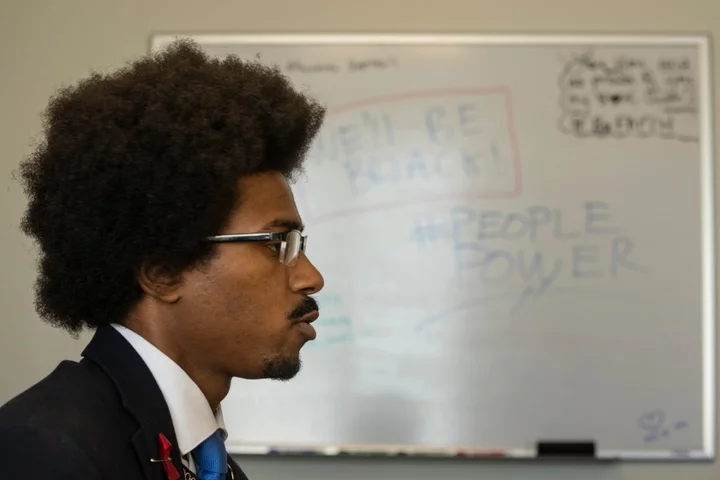
Tennessee lawmaker raised $860k in campaign donations after Republican expulsion over gun control protest
State Representative Justin Pearson of Tennessee said he raised $860,000 after he was expelled from the state legislature after participating in a gun control protest on the House floor. Mr Pearson, who represents a district in Memphis, was one of three Democratic legislators who faced expolsion from the chamber after their participation in a protest sparked by a mass shooting that claimed six lives at a Nashville school in March. But the explosion of Mr Pearson and Rep Justin Jones seems to have backfired on the Republican majority in several ways. Mr Pearson and Mr Jones were both re-appointed to their seats, and now Mr Pearson has revealed the effect his brief expolsion from the chamber had on his fundraising. Mr Pearson recieved donations from more than 31,000 people, the majority of whom donated in the week between his expulsion and his reinstatement by a unanimous vote of the Shelby County Board of Commissioners. The amount of money Mr Pearson recieved is all the more notable because Tennessee legislators are barred from fundraising during legislative sessions. “To see so much support, particularly from these tens of thousands of small-dollar donations, is a testament to what I believe is a people-powered movement, which is that we all have something to contribute, and our little bits of contribution makes a lot,” Mr Pearson told the Associated Press. Now, however, Mr Pearson has the kind of money in his campaign coffers that some state legislators never amass. The 28-year-old graduate of Bowdoin College, only raised around $144,000 during his successful campaign for the state House earlier this year. The Associated Press reported that the entire Tennessee House Democratic Caucus only raised around $233,000 during the 2022 election year. But that was a long time ago. When Republicans singled out Mr Pearson, Mr Jones, and Rep Gloria Johnson for their participation in the gun control protest, they quickly elevated them to national stardom. Mr Pearson, Mr Jones, and Ms Johnson became consistent presences on national television, visited the White House, and made appearances outside of Tennessee. National Democrats like Sen Chris Murphy of Connecticut helped fundraise. Now, given his considerable profile and youth, Mr Pearson has been mentioned as a potential rising star in a Tennessee Democratic Party that has fallen on hard times in recent years. It’s a remarkable rise for an environmental activist who wasn’t even in elected office until January. Read More After expulsion and reinstatement, Tennessee Reps. Pearson, Jones advance past Democratic primaries In Tennessee, expulsions echo a decades-old protest movement
2023-07-06 08:15
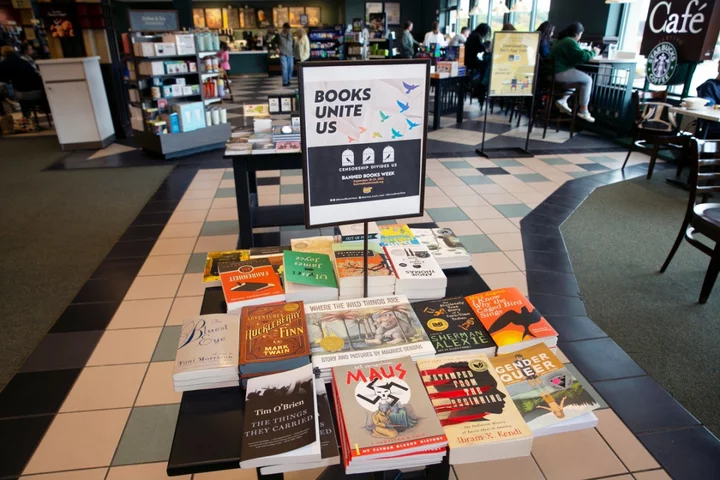
Florida schools remove books by John Milton and Toni Morrison and restrict Shakespeare under DeSantis rules
Over 150 books have been removed from a large, Orlando-area Florida school district, including classics like The Scarlet Letter, Paradise Lost, and The Invisible Man, as school officials review materials for sexual content under the state’s restrictive book ban laws. According to a teacher keeping track of books that have been temporarily pulled for review by the Orange County government, titles by Shakespeare have been restricted to only 10th through 12 graders, while other popular works like The Fault in Our Stars, Into the Wild, and Catch-22 have been put on the restricted list because of sexual material. One teacher told The Orlando Sentinel she was “gobsmacked” when she saw Shakespeare’s A Midsummer Night’s Dream was among the restricted works. She said she chooses works to study in class “to engage my students, to offer them literature that makes them think,” and that an accurate version of “the adolescent experience” in literature may contain some sexual themes, but still be valid for the classroom. “It’s just so frustrating and disheartening,” she said. The state’s book ban laws, passed under Republican governor Ron DeSantis, have caused empty shelves across Florida. “The books are sitting out on tables, they’re being boxed up and discarded,” Florida school librarian Keri Clark told The Independent earlier this year. “It’s just it’s a really sad sight. A lot of the kids keep looking through the window and it’s just it’s awful that I can’t let them come in and get books.” The Florida policyies are part of a nationwide surge of book bans. During the first half of the 2022-2023 school year, school officials tried to restrict at least 874 individual book titles, according to PEN America, a nearly 30 per cent spike from book challenges over the previous year. Overwhelmingly, the book ban attempts singled out works by and about people of colour and LGBT+ people, PEN found. At least 30 per cent of the impacted titles are books about race, racism, or feature characters of colour, and more than a quarter of all titles include LGBT+ characters or themes. Read More Biden condemns ‘hysterical’ threats to LGBT+ Americans as White House pushes back on book bans As conservatives target schools, LGBTQ+ kids and students of color feel less safe Florida mom who tried to ban Amanda Gorman’s book has ties to far-right groups
2023-07-06 06:17

Bank of America increases dividend by 9% after Fed stress test
NEW YORK Bank of America (BofA) said on Wednesday it planned to increase its quarterly common stock dividend
2023-07-06 05:50
